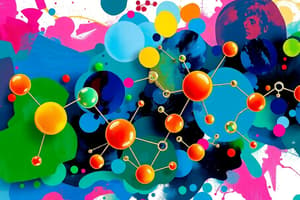Podcast
Questions and Answers
What is a rare but serious side effect of antibiotic treatment?
What is a rare but serious side effect of antibiotic treatment?
- Anaphylaxis (correct)
- Yeast infection
- Hearing loss
- Gastrointestinal upset
What is a consequence of antibiotic resistance?
What is a consequence of antibiotic resistance?
- Improved antibiotic efficacy
- Increased risk of treatment failure (correct)
- Reduced risk of C. diff infection
- Decreased risk of antibiotic-related side effects
How do beta-lactam antibiotics work?
How do beta-lactam antibiotics work?
- By disrupting bacterial membrane function
- By inhibiting bacterial protein synthesis
- By inhibiting bacterial DNA replication
- By inhibiting bacterial cell wall formation (correct)
What type of antibiotic is effective against a wide range of bacteria?
What type of antibiotic is effective against a wide range of bacteria?
What should be considered when selecting an antibiotic for a patient with a history of allergies?
What should be considered when selecting an antibiotic for a patient with a history of allergies?
What is an example of a bacteriostatic antibiotic?
What is an example of a bacteriostatic antibiotic?
What is a risk factor for antibiotic resistance?
What is a risk factor for antibiotic resistance?
How do macrolide antibiotics work?
How do macrolide antibiotics work?
Flashcards are hidden until you start studying
Study Notes
Side Effects
- Common side effects:
- Gastrointestinal upset (diarrhea, nausea, vomiting)
- Allergic reactions (rash, hives, itching)
- Yeast infections (vaginal or oral)
- Less common side effects:
- Kidney damage (nephrotoxicity)
- Hearing loss (ototoxicity)
- Increased risk of Clostridioides difficile (C. diff) infection
- Rare but serious side effects:
- Anaphylaxis (life-threatening allergic reaction)
- Stevens-Johnson syndrome (severe skin and mucous membrane reaction)
Antibiotic Resistance
- Occurs when bacteria develop mechanisms to survive antibiotic treatment
- Can be caused by:
- Overuse or misuse of antibiotics
- Inadequate treatment courses
- Genetic mutations in bacteria
- Consequences:
- Reduced effectiveness of antibiotic treatment
- Increased risk of treatment failure
- Increased risk of antibiotic-related side effects
Mechanism of Action
- Antibiotics work by:
- Inhibiting bacterial cell wall formation (e.g., beta-lactam antibiotics)
- Interfering with bacterial protein synthesis (e.g., macrolide antibiotics)
- Inhibiting bacterial DNA replication (e.g., fluoroquinolone antibiotics)
- Disrupting bacterial membrane function (e.g., polymyxin antibiotics)
Types of Antibiotics
- Bactericidal antibiotics:
- Kill bacteria directly (e.g., beta-lactam antibiotics)
- Bacteriostatic antibiotics:
- Inhibit bacterial growth and reproduction (e.g., tetracycline antibiotics)
- Broad-spectrum antibiotics:
- Effective against a wide range of bacteria (e.g., fluoroquinolone antibiotics)
- Narrow-spectrum antibiotics:
- Effective against a specific type of bacteria (e.g., macrolide antibiotics)
Quiz Case
- A 35-year-old patient presents with a severe case of pneumonia. The patient has a history of allergies and is currently taking medications for high blood pressure and diabetes.
- What factors should be considered when selecting an antibiotic for this patient?
- Allergic reactions to antibiotics
- Potential interactions with existing medications
- Effectiveness against the specific type of bacteria causing the infection
- Risk of antibiotic resistance
- Patient's underlying medical conditions (e.g., diabetes, high blood pressure)
Side Effects of Antibiotics
- Gastrointestinal upset, allergic reactions, and yeast infections are common side effects of antibiotics
- Less common side effects include kidney damage, hearing loss, and increased risk of C.diff infection
- Rare but serious side effects include anaphylaxis and Stevens-Johnson syndrome
Antibiotic Resistance
- Antibiotic resistance occurs when bacteria develop mechanisms to survive antibiotic treatment
- Causes of antibiotic resistance include overuse or misuse of antibiotics, inadequate treatment courses, and genetic mutations in bacteria
- Consequences of antibiotic resistance include reduced effectiveness of antibiotic treatment, increased risk of treatment failure, and increased risk of antibiotic-related side effects
Mechanism of Action of Antibiotics
- Antibiotics work by inhibiting bacterial cell wall formation, interfering with bacterial protein synthesis, inhibiting bacterial DNA replication, or disrupting bacterial membrane function
- Different types of antibiotics have different mechanisms of action, such as beta-lactam antibiotics inhibiting bacterial cell wall formation and macrolide antibiotics interfering with bacterial protein synthesis
Types of Antibiotics
- Bactericidal antibiotics kill bacteria directly, whereas bacteriostatic antibiotics inhibit bacterial growth and reproduction
- Broad-spectrum antibiotics are effective against a wide range of bacteria, whereas narrow-spectrum antibiotics are effective against a specific type of bacteria
- Examples of antibiotic types include beta-lactam antibiotics (bactericidal), tetracycline antibiotics (bacteriostatic), fluoroquinolone antibiotics (broad-spectrum), and macrolide antibiotics (narrow-spectrum)
Considerations for Selecting Antibiotics
- Factors to consider when selecting an antibiotic include the patient's allergies, potential interactions with existing medications, effectiveness against the specific type of bacteria causing the infection, risk of antibiotic resistance, and patient's underlying medical conditions
Studying That Suits You
Use AI to generate personalized quizzes and flashcards to suit your learning preferences.




